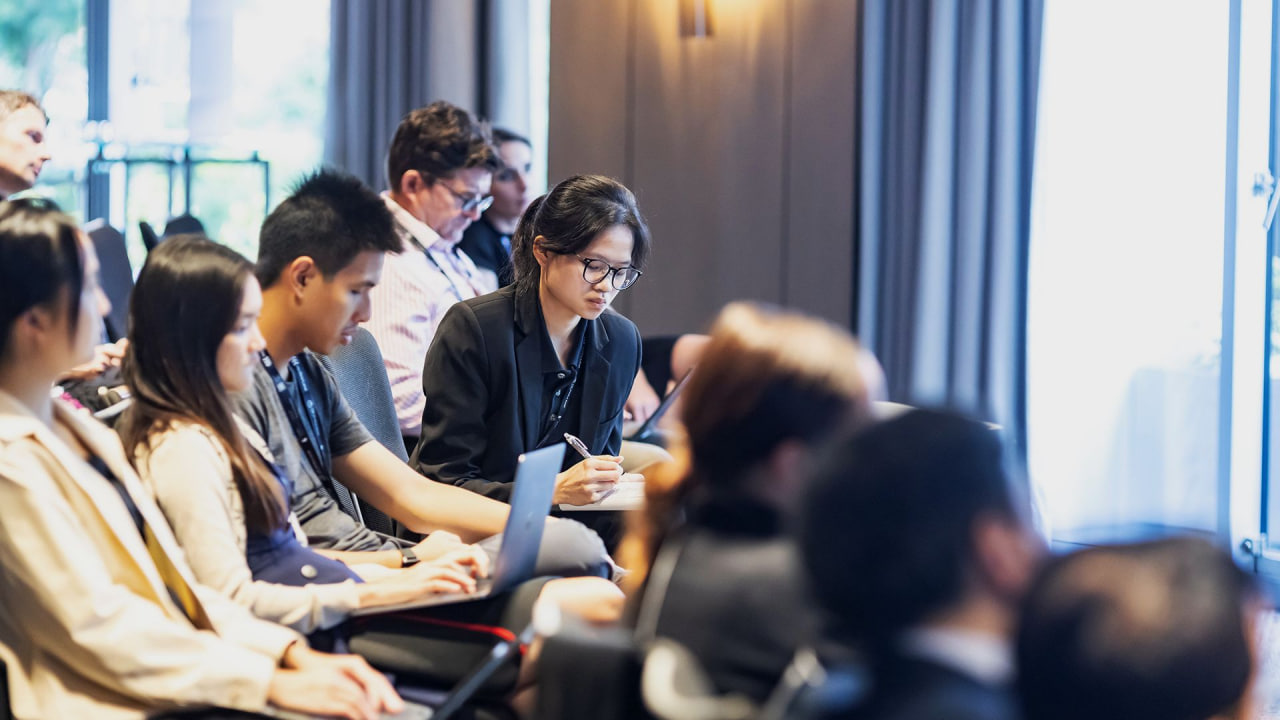
The 2024 Lee Kong Chian School of Business valedictorian discusses her journey from social justice advocate to sustainability analyst, and why she's betting her career on ASEAN's green future.
When you first speak with Hui Ling, her clarity of purpose is disarming. The 2024 Kwek Hong Png-SMU Lee Kong Chian School of Business Valedictorian, now an analyst at ENGIE Impact, has structured her career around a profound realisation: she won what she calls the “ovarian lottery” at birth — and with that privilege comes responsibility.
“Understanding that there are privileges I have as an individual compared to someone else of the same age in another part of the world,” she says, “made me realise I want to do something more with what I have.”
This grounding in justice — not simply environmental concern — is what first drew Hui Ling to sustainability work in junior college. For her, environmental sustainability is not separate from justice; it’s embedded within it. “It’s always been about justice,” she says. “And over time, I came to see environmental justice as just one of its many pillars.”
Building Bridges Between Theory and Practice
Hui Ling’s decision to choose SMU over other local universities was deliberate. “I needed to find a space where there were very clear bridges between industrial application and academic theory,” she explains.
What set SMU apart was its emphasis on industry immersion — adjunct professors who were also full-time managers or leaders and a pedagogy that encouraged real-world questioning.
Her approach was dynamic: challenge classroom theory with workplace insights, and test academic frameworks against real-life scenarios. “That’s how I did cross-cutting knowledge exchange — by holding both sides accountable.”
SMU’s Asia-centric exposure added further depth. Through the ASEAN Internship Programme (AIP), Hui Ling worked in Thailand with a global chemicals company Indorama — her first glimpse into a region where people acted on sustainability not out of regulatory compliance, but necessity. “They do it because they have to,” she says.
Her regional perspective was further shaped by a series of formative overseas experiences. It began with a winter programme at Universiti Teknologi PETRONAS in Malaysia, where she grappled with the complexities of the oil and gas sector. “There’s nuance in everything,” she reflects. “Even within grey, there are different shades of grey.”
She later broadened this lens through a social impact expedition to Vietnam and a Business Study Mission on the palm oil industry in Malaysia.
The ASEAN Conviction
While many graduates look west for opportunity, Hui Ling remains firmly committed to Southeast Asia. “The next decade will see the biggest change and development in our region,” she states with conviction.
She’s especially energised by Singapore’s renewable energy import initiatives — a potential catalyst for a long-awaited ASEAN power grid. Her commitment runs deeper than her job title. As part of her pro bono efforts, she worked with Wongphai — a sustainability solutions partner enabling a circular agricultural value chain in Thailand.
This hands-on approach stems from her belief that opportunities rarely arrive gift-wrapped — you have to seek them out. Her work with Wongphai began with a cold LinkedIn message, driven by her curiosity about how regional agricultural systems intersect with the carbon removal market.
“If you don’t think there are opportunities for you, you have to go out and make those opportunities yourself,” she says.
Fortitude and a Fierce Focus
Perhaps most striking about Hui Ling is her sense of urgency. “I plan my life like I’ll only live till 60,” she says matter-of-factly. “So I need to make every year count.”
Far from grim, the mindset fuels her focus and intention. It’s a framework for prioritisation, not pressure — a reminder that time is finite, and impact must be designed, not deferred.
That urgency is balanced by deep gratitude — to her family for enabling her freedom, to SMU for expanding her worldview, and to mentors who’ve shaped her thinking. “I always attribute where I am right now to my school,” she says without hesitation.
The Courage to Be Bold
When asked what advice she’d offer students hoping to make an impact in sustainability, her answer is immediate: “Be bold.”
She doesn’t sugar-coat the uncertainty. The sustainability field is evolving, and its business case is still being written in boardrooms around the world. “These are inherent risks anyone in this field will have to deal with and undertake.”
Still, Hui Ling stresses that boldness doesn’t mean recklessness. It’s about taking action within your means, guided by purpose. She’s keenly aware of the privileges that allow her to do what she does — and doesn’t expect others to replicate her path.
“Not everyone can afford to take the same risks — and that’s okay,” she says. “Any action is better than inaction. We all have different timelines.”
For a generation navigating global uncertainty, Hui Ling’s story offers both clarity and comfort: start where you are, act with intention, and never underestimate the ripple effects of courage.